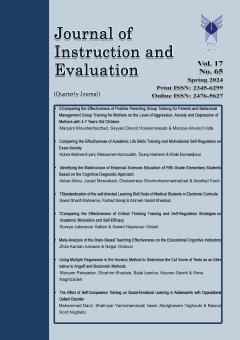Standardization of the self-directed learning skill scale of medical students in electronic curricula
Subject Areas : Educational Psychology
saeid sharifi rahnemo
1
![]() ,
farhad seraji
2
*
,
Azimeh sadat khakbaz
3
,
farhad seraji
2
*
,
Azimeh sadat khakbaz
3
1 - PH.d student of Curriculum Studies, Bu-ali-Sina University, Hamadan, Iran
2 - Professor of Curriculum Studies, Bo Ali Sina University, Hamadan, Iran
3 - Assistant Professor of Curriculum Studies, Bu Ali Sina University, Hamadan, Iran
Keywords: Medical Students, electronic curriculum, self-directed learning scale, Normative assessment,
Abstract :
The present study was conducted with the aim of standardizing the self-directed learning skill scale of medical students in electronic curricula. This research is a correlational descriptive in terms of applied purpose and in terms of nature and method. The statistical population of this research was all medical students of Hamedan University of Medical Sciences who participated in the present research online by defining the desired tool on the Pressline website. According to the use of confirmatory factor analysis in this research, a sample of 550 people completed the questionnaire through voluntary and online sampling. In order to collect the desired data, an eight-item questionnaire "self-discovery of medical students in electronic curricula" was used. In order to analyze the data, first to check the scale factors and the distribution of the items from exploratory factor analysis using SPSS-28 software and then to validate the items and factors from confirmatory factor analysis with the software Smart-PLS-3 software is used. The results showed that the factor loadings of each of the items in 8 factors after rotation were confirmed with the desired variance because the absolute value of these coefficients is higher and the corresponding factor has a greater role in the total changes (variance) of the item variable. has an opinion Therefore, according to the results of the exploratory factor analysis, the research components were confirmed in eight factors: self-efficacy, self-management, academic help-seeking, motivation to learn, responsibility, self-organization, self-control, and self-evaluation with 73 items and the factor loads They are desirable. The confirmatory factor analysis also showed that the items of all eight components of the research, except for item five, have the necessary sufficiency to stay in the research, and the values of their factor loadings were appropriate and have a good fit. Also, Cronbach's alpha for all eight.

